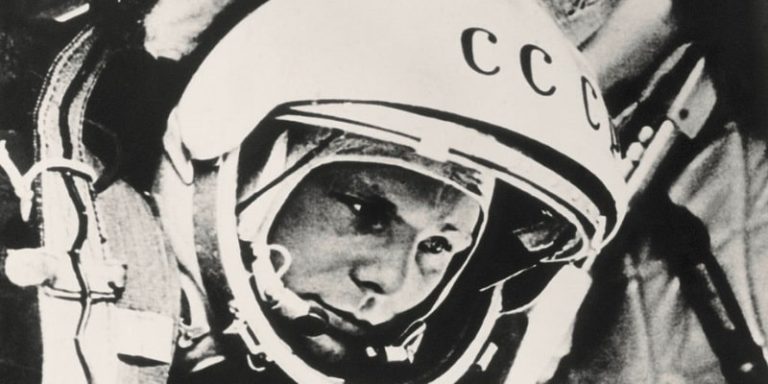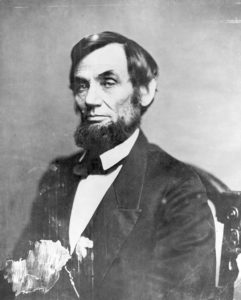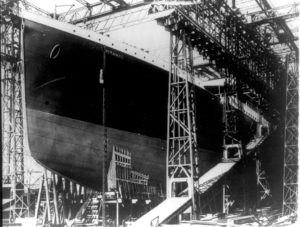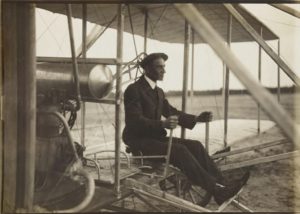This Week in History: April 10-16
The first human in space and the assassination of President Abraham Lincoln.
By: Kelli Ballard | April 10, 2022 | 1144 Words

Yuri Gagarin (Photo by Imagno/Getty Images)
“The pull, the attraction of history, is in our human nature. What makes us tick? Why do we do what we do? How much is luck the deciding factor?” ~David McCullough
April 12, 1961: First Human in Space
World War II had ended and the United States and Soviet Union were in the middle of the Cold War. During this time, the two superpowers competed in just about every way, including what was called the Space Race. Each tried to outdo the other at each step of discovering space – and the Soviets got their guy into space first.
On October 4, 1957, the Soviet Union launched the first satellite, Sputnik 1. It was the first man-made object to be put into Earth’s orbit. Americans became concerned that Russia would soon be able to launch weapons from space, so gathering intelligence about what the Russian military was doing became a top priority.
 In 1959, Russia had another success with the launch of Luna 2, the first probe to hit the moon. And then, to top it off, Russian cosmonaut Yuri Gagarin became the first human in space, traveling in a capsule-like craft called Vostok 1. Gagarin performed one full orbit around the Earth, before ejecting from the craft and parachuting to the ground. The flight was 108 minutes long.
In 1959, Russia had another success with the launch of Luna 2, the first probe to hit the moon. And then, to top it off, Russian cosmonaut Yuri Gagarin became the first human in space, traveling in a capsule-like craft called Vostok 1. Gagarin performed one full orbit around the Earth, before ejecting from the craft and parachuting to the ground. The flight was 108 minutes long.
The United States began Project Mercury, and NASA engineers designed the spacecraft they hoped would take Americans into space. It was smaller than Gagarin’s and cone-shaped. Chimpanzees were sent in the craft for the initial tests. While a final test flight in March 1961 was ahead of Gagarin’s flight, it wasn’t until May 5 that astronaut Alan Shepard became the first American in space.
While the Soviet Union had the first victories in the Space Race, the US pulled ahead when it landed men on the moon in 1969.
April 14, 1865: Assassination of President Abraham Lincoln
On April 14, 1865, while watching a play at Ford’s Theatre in Washington, DC, President Abraham Lincoln was assassinated by John Wilkes Booth.
Booth, an actor, sympathized with the south in the Civil War but stayed in the north to pursue his acting career. He and a few others decided to kidnap Lincoln and take him to the Confederate capital in Richmond, Virginia. But Lincoln did not show up to the spot where they had planned to take him, and their plot failed.

Abraham Lincoln (Getty Images)
Richmond fell to Union forces two weeks later, and General Robert E. Lee surrendered, making their plan useless. Booth and his comrades thought that if they assassinated the president, as well as Vice President Andrew Johnson and Secretary of State William H. Seward, then the government could be overthrown. Booth became desperate and devised another plan. When he found out the president would be attending the play “Our American Cousin,” he set his idea into motion.
The president was watching the play from a private box above the stage, with his wife Mary Todd Lincoln, Army officer Henry Rathbone, and Rathbone’s fiancé. Booth snuck inside the box and fired a single-shot derringer pistol into the back of Mr. Lincoln’s head. Rathbone immediately went after Booth and was stabbed in the shoulder. Booth jumped onto the stage and shouted the Virginia state motto: “Sic semper tyrannis!” which means “Thus always to tyrants!” The Latin phrase suggests that a tyrant will always have a downfall.
Lincoln was taken to a boardinghouse across the street, where a doctor said the president would probably not live through the night. Edward Curtis, an Army surgeon, wrote about the incident and said when the medical team saw the bullet that had killed the president, everyone just stared at it, “the cause of such mighty changes in the world’s history as we may perhaps never realize.”
The search for Booth was one of the largest manhunts in history. Detectives, police, and 10,000 federal troops joined in to track him down. On April 26, Booth was caught hiding in a barn. He was shot and died later that day. Four others were charged and convicted for their part in the conspiracy to kidnap Lincoln, including Mary Surratt, whose boardinghouse was the meeting place for the group.
Other Notable Mentions
April 10, 1998: Northern Ireland reached an agreement that ended 26 years of rule from England. The agreement called for Protestants and Catholics to work together.
April 11, 1968: President Lyndon B. Johnson signed the Civil Rights Act.
April 11, 1970: Apollo 13 launched from Cape Kennedy. About 56 hours into the flight, an oxygen tank exploded. Astronaut John L. Swigert said, “Houston, we’ve had a problem,” after he saw the warning light and heard a loud bang sound.
April 11, 1983: Harold Washington, with 51% of the vote, became the first black mayor of Chicago. He was re-elected in 1987.

Titanic at a shipyard in Belfast (Photo by Universal History Archive/Getty Images)
April 12, 1861: The Civil War began when Fort Sumter in Charleston, South Carolina was fired upon at 4:30 a.m. by Confederate troops under General Pierre Beauregard’s command.
April 12, 1981: The first space shuttle, Columbia, was launched with astronauts John Young and Robert Crippen.
April 14, 1775: The “Society for the relief of free Negroes unlawfully held in bondage” was founded. It was the first abolitionist group in America.
April 14, 1828: Noah Webster published the first dictionary of American-style English titled American Dictionary of the English Language.
April 15, 1817: Thomas H. Gallaudet and Laurent Clerc founded the first American school for the deaf in Hartford, Connecticut.
April 15, 1912: The Titanic sank after hitting an iceberg. There were 2,224 people aboard.
April 16, 1862: Slavery was abolished by Congress in the District of Columbia. They granted $1 million for freed slaves as compensation.
Famous Birthdays
Joseph Pulitzer (April 10, 1847) was born in Budapest, Hungary. He was a journalist and publisher. The Pulitzer Prizes were named after him when he created an award for excellence in journalism.

Wilber Wright at the controls of the plane (Photo by Fine Art Images/Heritage Images via Getty Images)
Edward Everett (April 11, 1794) was born in Dorchester, Massachusetts. In 1863, he gave the main address at the Gettysburg Battlefield, followed by President Abraham Lincoln who then gave the Gettysburg Address.
Thomas Jefferson (April 13, 1743) was born in Albermarle County, Virginia. He was the author of the Declaration of Independence and the third president of the US. He died on July 4, 1826, the same day as his friend, John Adams.
Wilbur Wright (April 16, 1867) was born in Millville, Indiana. He and his brother Orville made the first successful flight of an aircraft with a motor on December 17, 1903. By 1905, the Wright brothers built a plane that could stay in the air for thirty minutes.
Charlie Chaplin (April 16, 1889) was born in London, England. A comedian and silent movie actor, he performed in many movies. In 1975, Queen Elizabeth II knighted him.
















